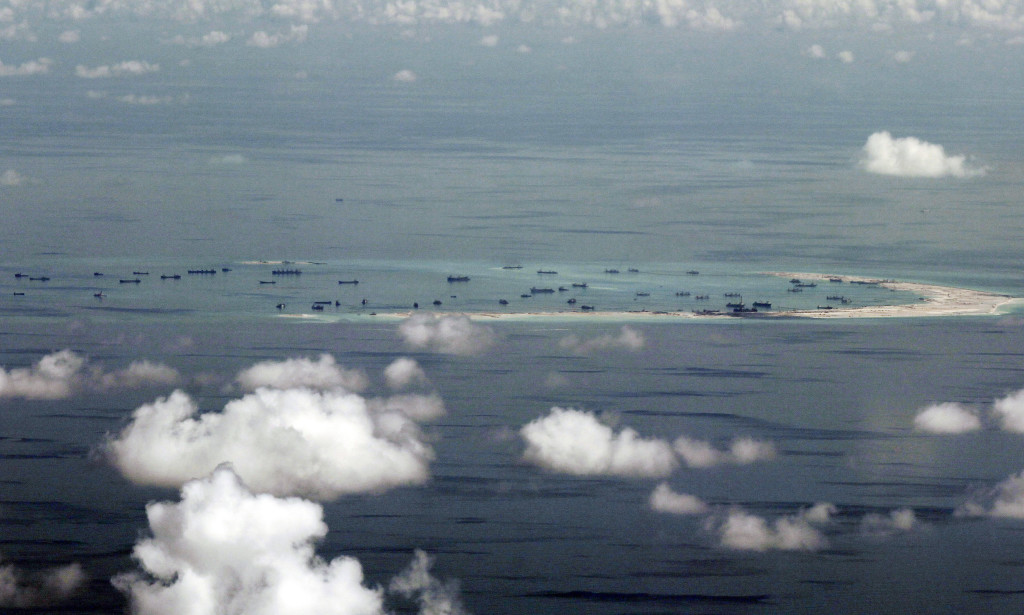China divide and rule splits Asean

This May 11, 2015, file photo, shows land reclamation of Mischief Reef in the Spratly Islands in the South China Sea. A landmark ruling on an arbitration case filed by the Philippines that seeks to strike down China’s expansive territorial claims in the South China Sea will be a test for international law and world powers. China, which demands one-on-one talks to resolve the disputes, has boycotted the case and vowed to ignore the verdict, which will be handed down Tuesday, July 12, 2016, by the U.N. tribunal in The Hague. (Ritchie B. Tongo/Pool Photo via AP, File)
VIENTIANE—Southeast Asian nations are in unparalleled disarray over Beijing’s saber-rattling in the South China Sea, analysts and insiders say, with the fractures set to deepen as staunch China ally Laos hosts top regional diplomats this weekend.
US Secretary of State John Kerry and Chinese Foreign Minister Wang Yi are among the delegates due to fly in from Sunday for two days of meetings in Vientiane, the capital of the communist nation.
The South China Sea is set to cast a long shadow over the summit, which is hosted by the 10-member Association of Southeast Asian Nations (Asean).
On July 12, the UN-backed Permanent Court of Arbitration in The Hague found there was no legal basis for China’s claims to most of the strategic and resource-rich South China sea, a ruling rejected as “waste paper” by Beijing.
Asean prides itself on consensus diplomacy but divisions have never been starker with Beijing blamed for driving a wedge between members.
Beijing loyalists
The Philippines brought the international arbitration case, while fellow Asean members Vietnam, Malaysia and Brunei also have competing claims to parts of the sea.
But Cambodia and host Laos are Beijing loyalists, with both impoverished nations weaned on Chinese aid and investment.
Shortly after The Hague ruling, Beijing announced more than half a billion dollars in soft loans for Cambodia.
“China has succeeded in splitting Asean on the South China Sea issue through its allies Laos and Cambodia,” an Asean diplomat told Agence France-Presse (AFP) requesting anonymity.
The bloc’s inability to remain united “will surely weaken Asean not just on the South China Sea problem but as a regional grouping,” the diplomat added.
Talking shop?
Asean initially touted itself as the best forum for China to negotiate with rival claimants over the sea, given so many are members.
But Beijing has resisted that approach, insisting that territorial disputes must be settled bilaterally.
As a result, Beijing has successfully moved to divide the bloc.
Chinese pressure was blamed last month for an embarrassing U-turn by the regional bloc as members suddenly disowned an apparent joint statement released by Malaysia that condemned Beijing’s aggression in the South China Sea.
That has led to fears of a repeat of a 2012 summit in Cambodia where the bloc failed to issue a joint communiqué for the first time in its history because of disagreements over the waters.
Diplomats are already in Vientiane trying to hash out a response to last week’s tribunal ruling before the foreign ministers arrive.
But insiders say consensus is a long way off.
Critics have long derided Asean as an ineffective talking shop and in the face of the region’s most pressing security issue, some analysts believe the bloc is struggling for relevance.
“Asean suffers from inherent institutional paralysis,” Richard Javad Heydarian, a regional expert at De La Salle University in Manila, told AFP.
“There is this sense of frustration among core Asean countries that China is essentially buying the loyalty of smaller Asean countries,” he added.
China claims nearly all of the strategic sea, home to some of the world’s most important shipping routes, and has steadily strengthened its toehold by converting reefs and sandbars into artificial islands.
Satellite images of Chinese-built airstrips and apparent sea defenses have seen the fissures widen within Asean.
To its defenders, Asean has brought trade and diplomatic cooperation to a region spanning communist autocracies such as Laos and Vietnam, the tiny Islamic sultanate of Brunei and populous democracies like Indonesia and the Philippines.
Laos, one of Asia’s poorest and most tightly controlled countries, chairs Asean this year.